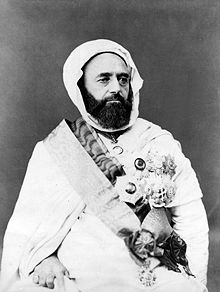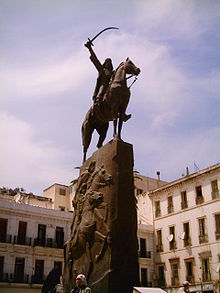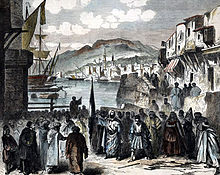- Abd al-Qadir al-Jaza'iri
-
For the song, see Abdel Kader (song). For the Palestinian nationalist, see Abd al-Qadir al-Husayni.
Abd al-Qadir al-Jaza'iri
عـبـد الـقـادر الـجـزائـري
Born Abd el-Kader ben Muhieddine
September 6 , 1808
Mascara, Regency of AlgiersDied May 26, 1883 (aged 74)
Damascus, Damascus Vilayet, Ottoman EmpireAbd El-Kader Ben Muhieddine (6 September 1808 near Mascara – 26 May 1883 Damascus), (Arabic: عبد القادر ابن محيي الدين ʿAbd al-Qādir ibn Muḥyiddīn) known as Emir "Prince" ʿAbd al-Qādir or ʿAbd al-Qādir al-Ǧazāʾirī, was an Algerian Islamic scholar, Sufi, political and military leader who led a struggle against the French invasion in the mid-nineteenth century, for which he is seen by some Algerians as their national hero.
Contents
Name
`Abd al-Qādir is often referred to only as `El Amir Abdelkader, since al-Jazā'iri simply means "the Algerian". His name can be variously transliterated from its Arabic spelling as Abd al-Kadir, Abdel Kader, Abdelkader, and other variant spellings. He is also often given the titles amir, prince, and shaykh or sheik.
Early years
`Abd al-Qādir was born near the town of Mascara near Oran, in 1807 or 1808.[1] His father, Muhyi al-Din al-Hasani, was a shaykh in the Qadiri sufi order of Islam. He was a Banu Ifran Berber[2][3] and claimed descendance from Muhammad.[4]
In his childhood he memorized the Qur'an and was trained in horsemanship, theology and linguistics, and received an education far better than that of his peers. In 1825, he set out for the Muslim pilgrimage, hajj, with his father. While in Mecca, he encountered Imam Shamil; the two spoke at length on different topics. He also traveled to Damascus and Baghdad, and visited the graves of noted Muslims, such as Shaykh Ibn Arabi and Sidi Abd-el-Kader El Jilani named also El-Jilali in Algeria. This experience cemented his religious enthusiasm. On his way back to Algeria, he was impressed by the reforms carried out by Muhammad `Ali in Egypt.[citation needed] He returned to his homeland a few months before the arrival of the French.
French invasion and resistance
In 1830, Algeria was invaded by France; French colonial domination over Algeria supplanted what had been domination in name only by the Ottoman Empire. Within two years, `Abd al-Qādir was made an amir and with the loyalty of a number of tribes began a rebellion against the French. He was effective at using guerrilla warfare and for a decade, up until 1842, scored many victories. He often signed tactical truces with the French, but these did not last. His power base was in the western part of Algeria, where he was successful in uniting the tribes against the French. He was noted for his chivalry; on one occasion he released his French captives simply because he had insufficient food to feed them. Throughout this period `Abd al-Qādir demonstrated political and military leadership, and acted as a capable administrator and a persuasive orator. His fervent faith in the doctrines of Islam was unquestioned.
Until the beginning of 1842 the struggle went in his favor; however, the resistance was put down by Marshal Bugeaud. In 1837, `Abd al-Qādir signed the Treaty of Tafna with Bugeaud, in which he recognized France's sovereignty in Oran and Algiers, while France recognized his control over the remaining two-thirds of the country, mainly the interior. When French troops marched through a mountain pass in territory `Abd al-Qādir claimed as his in open defiance of that claim, he renewed the resistance on October 15, 1839.
`Abd Al-Qādir was ultimately forced to surrender. The French armies grew large, and brutally suppressed the native population and practiced a scorched-earth policy. `Abd Al-Qādir's failure to get support from eastern tribes, apart from the Berbers of western Kabylie, also contributed to the quelling of the rebellion. On December 21, 1847, after being denied refuge in Morocco because of French diplomatic and military pressure on its leaders, `Abd al-Qādir surrendered to General Louis de Lamoricière in exchange for the promise that he would be allowed to go to Alexandria or Acre. Two days later, his surrender was made official to the French Governor-General of Algeria, Henri d'Orléans, duc d'Aumale. The French government refused to honour Lamoricière's promise and `Abd Al-Qādir was exiled to France.
Life in exile
Al-Qādir and his family were detained in France, first at Toulon, then at Pau, and in November 1848 they were transferred to the château of Amboise. There he remained until October 1852, when he was released by Napoléon III and given an annual pension of 200 000 francs[citation needed] on taking an oath never again to disturb Algeria. He then took up residence in Bursa, today's Turkey, moving in 1855 to Amara District in Damascus. He devoted himself anew to theology and philosophy, and composed a philosophical treatise, of which a French translation was published in 1858 under the title of Rappel à l'intelligent. Avis à l'indifférent. He also wrote a book on the Arabian horse.
While in Damascus he befriended Jane Digby and Richard and Isabel Burton. In July 1860, conflict between the Druze and Maronites of Mount Lebanon spread to Damascus, and local Druze attacked the Christian quarter, killing over 3,000 persons. `Abd al-Qādir and his personal guard saved large numbers of Christians, bringing them to safety in his house and in the citadel. For this action the French government increased his pension to 4000 Louis and bestowed on him the Grand Cross of the Légion d'honneur. He was also honoured by Abraham Lincoln for this gesture towards Christians with several guns that are now on display in the Algiers museum.
In June of 1864, Al-Qādir became a Freemason.[5][6]
In 1865 he visited Paris on the invitation of Napoléon III and was greeted with both official and popular respect.
`Abd Al-Qādir died at Damascus on 26 May 1883 and was buried near the great sufi Ibn Arabi in Damascus.
Legacy
 Emir Abd al-Qadir place (Algiers)
Emir Abd al-Qadir place (Algiers)
Abd al-Qādir is recognized and venerated as the first hero of Algerian independence. However, there is some controversy around his devotion to his people after his capture. A letter he wrote to Napoleon reveals his loyalty to the French leader.[7] Not without cause, his green and white standard was adopted by the Algerian liberation movement during the War of Independence and became the national flag of independent Algeria. He was buried in Damascus in the same mausoleum as Ibn Arabi, until the Algerian government brought his remains back to Algeria to be interred with much ceremony on 5 July 1966, the fourth anniversary of independence and the 136th anniversary of the French conquest. The Emir Abdel Kader University and a mosque bearing his name were constructed as a national shrine in Constantine, Algeria.
An indication of the international fame of al-Qādir's struggle is given by the way that the town of Elkader, Iowa in the United States came to be named after him. When the new community was being officially planned, on what was then the American frontier, founders Timothy Davis, John Thompson and Chester Sage—none of them Arabs or Muslims—were so impressed with what they heard of the Algerian leader's valiant struggle that they decided to name the new town for him. The American town has retained its Algerian connection by establishing a sister city connection with Mascara, Algeria.
His notable children and grandchildren:
- Prince Muhammad ibn Abd al-Qadir al-Jazairi
- Prince Said al-Jazairi, who took over government affairs of Syria when the Ottomans evacuated on 28 September 1918 and stayed in office until the Arab Army entered Damascus on 1 October 1918.
Baseball statistician and sportswriter Rany Jazayerli claims to be the great-great-great-great nephew of Abd al-Qādir.[8]
See also
- French rule in Algeria
References
- ^ Chambers Biographical Dictionary, ISBN 0-550-18022-2, page 2
- ^ P. Rozet, L’univers ou histoire et description de tous les peuples, p. 193
- ^ [1]
- ^ Par Société languedocienne de géographie, Université de Montpellier. Institut de géographie, Centre national de la recherche scientifique (France) Publié par Secrétariat de la Société languedocienne de géographie, 1881. Notes sur l'article: v. 4, page 517
- ^ http://www.archive.org/stream/lifeofabdelkader00churrich#page/328/mode/2up
- ^ http://www.archive.org/stream/freemasonryinho01morrgoog#page/n586/mode/2up
- ^ http://www.culture.gouv.fr/public/mistral/caran_fr?ACTION=CHERCHER&FIELD_1=REF&VALUE_1=03054
- ^ http://www.ranyontheroyals.com/2010/07/abd-el-kader-and-massacre-of-damascus.html
External links
- Abd Al-Kadir's Struggle For Truth[dead link]
- Famous Quotes by Abd al-Qadir
- Abd al-Qadir al-Jaza'iri collected news and commentary at The New York Times
 Texts on Wikisource:
Texts on Wikisource:
- James Wood (1907). "Abd-el-Kadir". The Nuttall Encyclopædia.
- Chisholm, Hugh, ed (1911). "Abd-el-Kader". Encyclopædia Britannica (11th ed.). Cambridge University Press.
- "Abd-el-Kader". The New Student's Reference Work. Chicago: F. E. Compton and Co. 1914.
- "Abd-el-Kader". Collier's New Encyclopedia. 1921.
Categories:- 1808 births
- 1883 deaths
- Algerian rebels
- Algerian Sufis
- History of Algeria
- History of Damascus
- Grand Croix of the Légion d'honneur
- People from Mascara Province
- Algerian guerrillas
- Heads of state in Africa
Wikimedia Foundation. 2010.

